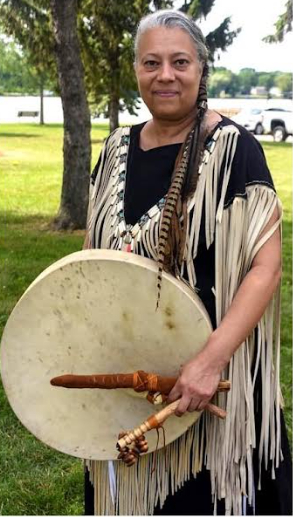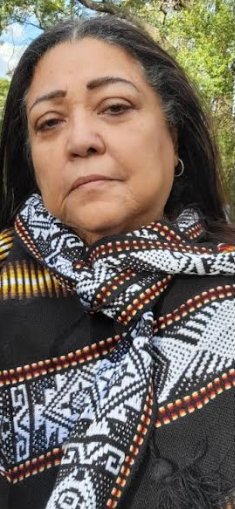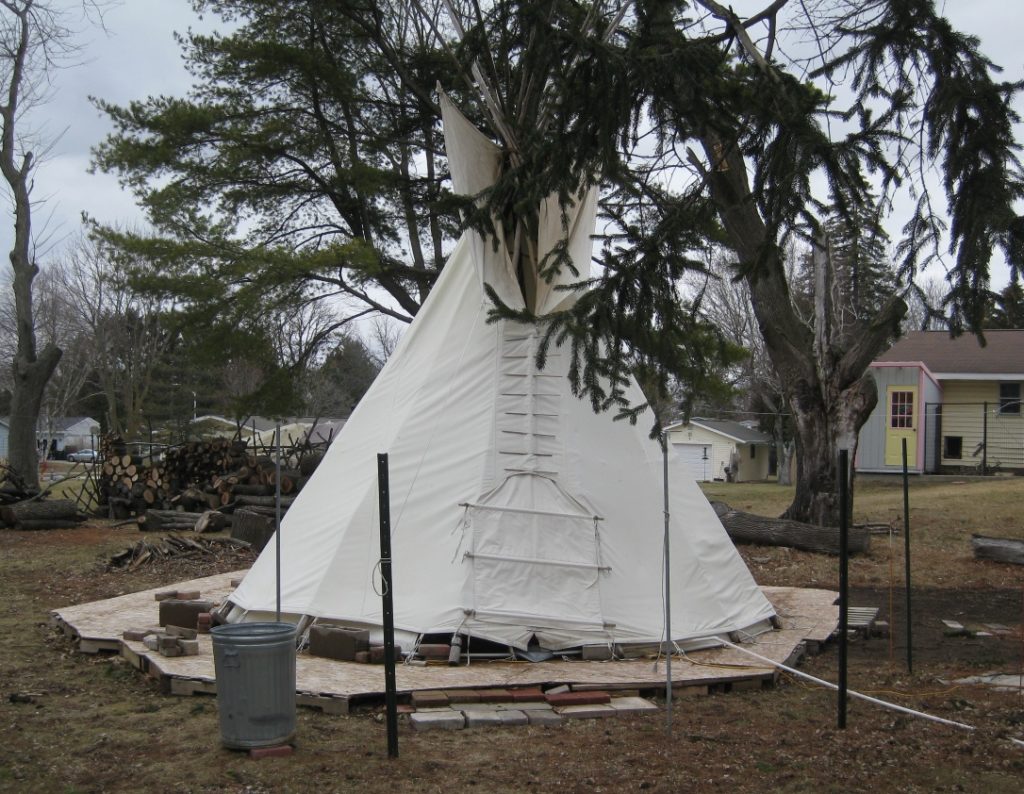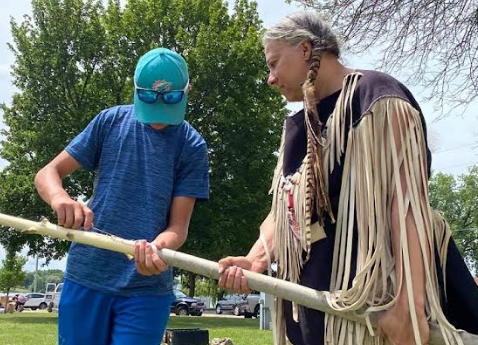
The mission of the Kwewag Indigenous Culture Church (KICC) is to “teach the world a new (yet very old) way to live, in harmony with our planet and each other, guided by our ancestors, spiritual connection to everything, and the descendants who carry these long-cherished secrets.”
“I work through spirit,” Dawn Moneyhan, the president, manager, and chief clergy of the KICC, tells Madison365. “Or I should say, spirit works through me.”

For the past several years, Moneyhan, a middle-aged Indigenous woman born and raised in Wisconsin, and her husband were doing living history events around the Wisconsin area. They found a group of people in Ashippun, a small town in Dodge County northwest of Milwaukee, who’d been doing this work for decades and joined them along for the ride. It came out of a deep desire to genuinely connect with their culture after seeing it too often forgotten or commercialized and commodified without true respect and reverence for the people and the histories involved.
“I learned a lot about the procedures and the setups and the breakdowns and things that I had never had the chance to do before,” Moneyhan says. “I learned about how the public was receiving us and why. It gave me a chance to really dive into my culture in a way that I’ve never had an excuse to do before.”
With the travel, physical labor, and dealing with shifty and often severe weather conditions, it was a struggle for them to sustain engaging the general public although they knew it was necessary work. Moneyhan also felt the need to venture on her own. She fundraised to get her own tipi and began hosting her own events. As she saw the demand grow for people interested in attending, she came to her crew and conjured the idea of the KICC, a structure they could call their own and open to people for private bookings at their own convenience.
“I pulled the crew together and I said, ‘Well, why don’t we start our own business and do this on a private location that’s ours so that people can book with us and come to us on their time?’” Moneyhan remembers. “They’re gonna learn more if they come to us knowing that they’re coming to a class or something instructional that’s on their time that they’re ready for, prepared for, interested in. It’s not just a ‘Let’s go see what this is.’”

Dr. Delia Ross is the secretary and treasurer of the KICC. Amber Sikes is the vice president, a licensed vet tech, and will become the on-site veterinarian once they finish a Doctor of Veterinary Medicine (DVM). Moneyhan sees Sikes as the future of the KICC.

“Amber is going to be our long-term vet and also intended to inherit what we are building, so that it goes forward after Delia and I are gone. Amber is the same age as my youngest daughter. They are 26 now and allotted time to really carry forward what we’re doing. We’re actually writing things down so that there’s a playbook to follow later on. We often talk about the people that will replace myself and Delia someday, and how that’s going to be chosen and we want to make sure that we’re always Indigenous run,” Moneyhan said.
Moneyhan and Dr. Ross are very intentional about the KICC being a space to preserve culture and educate others. They are both registered members of the Little River Band of Ottawa Indians. While they grew close as a part of their tribe and were on the cultural committee together, conflict arose through Moneyhan’s pursuit of creating the KICC and getting their culture to the people, which prompted her to step down from the committee. Moneyhan and Dr. Ross then began pushing their energy toward organizing KICC.
“I went to bed one night after our Amik-Aki event and I had a dream. And I understood when I woke up that it wasn’t just a dream. It was an inspiration. I was getting instructions. It was like a roadmap, almost a movie playing out in my head. I could see it actually happening. So I knew I had to do it,” Moneyhan said.
When Moneyhan was two years old, it was illegal in the United States for her Indigenous culture to be taught and practiced. She was basically deprived of her culture for her entire upbringing.
It wasn’t until 1978 when the American Indian Religious Freedom Act was passed, stating that Congress will make no law prohibiting the free exercise of a religion. However, many Native folks were still persecuted for practicing their culture publicly. The radical premise of the KICC presents a space for Moneyhan, Dr. Ross, and other Indigenous folks to not only practice their culture but share it and showcase its powerful tradition and countless intricacies with the rest of the world.
“Our indigenous history is long. It’s tragic, and it’s ongoing. It was still illegal to be me when I was two. I was eight years old before it was actually legal for us to practice our cultures, religions, spiritual beliefs, traditions, wear our clothing, any of that stuff in the United States,” Moneyhan said. “What we’re doing with the KICC is meant to help heal. It’s also meant to help teach the world to live a better life because we can’t ever go through that again. We can’t go backward.”
The KICC was incorporated in September 2021. They wanted the attention and fundraising abilities that having a nonprofit would have. It was initially going to be a nonprofit camp, but they were hit with a realization from their lawyer that they wouldn’t qualify for the exemptions they were looking for unless they were a church. Moneyhan was confused about how to make this happen, but then she had an epiphany.
“I started over as if we were a church. And all of a sudden, it made sense. We fit. The reason for that is because all of our indigenous cultures are spiritual based. You can’t have the culture without the spirituality. They’re forever tied because the spirituality is the foundation of the culture. So a church made sense,” Moneyhan said.
Moneyhan and Dr. Ross got ordained to perform legal marriage ceremonies and envision the campground as a wonderful venue for weddings. They will open up the KICC to anyone, not just Indigenous folk, to be educated and immersed in their rituals and belief systems. Their doctrine follows the seven grandfather teachings that many tribes abide by, adhering to the principles of honesty, truth, humility, love, wisdom, courage, and respect.
The events they run are very hands-on and require a lot of physical labor. They show people how to properly set up and take down a tipi. They have a tomahawk throwing instructor. They have seen how important it is to have people who attend the events very involved. It shows them the authentic elements of their ancient culture and lets them feel the value of practicing these traditions.
“It’s not just ‘Oh, come watch a display.’ This is ‘Pick up a tipi pole! See that tree over there? You’re going to help cut that down!’ This is hands-on learning because people retain it when they actually do it. And when they try something, they’re more inspired to want to keep trying until they get it right,” Moneyhan said. “All we’re really doing is teaching all of those skills that have been forgotten. But we’re doing it with our culture applied to it because of all the cultures in the world, ours is still secret.”
According to Moneyhan, tribes used to visit each other frequently and share each other’s traditions in community. However, once that cultural exchange became illegal, secrecy became a survival tactic. They want people to digest the purpose behind their ancestors living this way and using these structures. The plan of the KICC is to dismantle that urge for secrecy and embrace the cultural exchange to create a safer, more sustainable world.
“With our culture, we understand we know the secrets that the world is missing. It’s all wrapped up in the Indigenous culture and the reason the rest of the world doesn’t have it is because most of our people are still too afraid to share it. So we’re not afraid. And it’s time that we’re standing up to the elders that are traditional and think it should stay secret while we are pulling together all of the descendants and the ancestors of today, who understand they need to know it too because they’ve never learned it. And we’re gonna teach it to the whole world because we want to help save our planet,” Moneyhan said.
Moneyhan and Dr. Ross have clear visions of how they want the KICC to be and are extremely ambitious. They want to build several wigwam villages, tipi villages, bison and elk herds that are respected as wild animals, and provide overnight stays where they will teach their students and visitors how to assemble. They plan on maintaining gardens to grow their own sacred medicines, planting specific trees important to their culture, having snow snake events every winter for people to come and learn. All of these skills would come together in the survival events where people would only have the supplies the ancestors had pre-colonization, be pushed to their limits and hopefully entice them to come back.
“If they come and learn all of these different lessons, they will be completely prepared to complete our survival events in record time. The goal is going to be to source all of the items that we provide on a list. So they’re going to have to go out with one or two of our interns who are trained for this. They will have to identify and responsibly harvest the right plants that we put on our list and bring them back… We’ll have limitless different things that we can put on our lists and we’ll change them up regularly. So it’s always a different experience each time. Nobody can come in, learn it all at once and ace it the next time around,” Moneyhan said.

However, acquiring the necessary resources and support to acquire and build their property has been very difficult. They don’t have any funding and aren’t allowed to do much of their own. According to the IRS, churches are tax-exempt as a 501C3, but any fundraising program is not. They completed the 1023 form, but that has a six-month wait before a declaration of whether one can register for fundraising. A problem they keep running into is that many federal, state and private grants read “not allowed for property purchase.”

“We’ve had a donation check written out to the tribe and we sent it back. We made sure to be very clear in the very beginning that our tribe has no connection to our church,” Moneyhan says. “This is something that we are doing because it’s our dream to help save the world. Our tribe doesn’t support us, they don’t not support us, we haven’t even asked them if they support us. Because they’re not involved in what we’re doing other than we are going to make ourselves available to the members.
“You can imagine with the real estate market, what it is the property that we are in need of to keep two herds of animals, a couple of horses to help do the work, build the villages and all of these gardens,” she adds. “We need some acreage and right now we’re looking at a bed and breakfast down in Belleville, just outside of Madison. But the asking price is $2.2 million. And right now we’re lucky if we have maybe $200 to our name and no ability to get out there and fundraise.”
They are reaching out for private donors and are very open to including people in helping them fulfill their mission of creating the KICC as they see it. They are seeking long-term sustainability through an internship program where they would offer their Indigenous teachings to students in public schools and universities who would have to earn their marks learning the valuable pedagogy the KICC would provide. They hope to inspire youth to not only share what they learn and expand their knowledge but potentially build a pipeline for future members of the KICC.
However, none of these plans can become tangible until they have a location.
“How is a brand-new business supposed to function for six months without the ability to do any fundraising? That doesn’t even make sense. But yet, that’s where we’re finding ourselves,” Moneyhan said. “I have had a number of times where I’ve broken down in tears because we’re facing so many obstacles and brick walls that I’m afraid we’re not going to get this done before the economy crashes so hard that it gets to be an impossibility.”
Moneyhan and Dr. Ross, both distinguished Indigenous women of color, are facing racism, sexism, and ageism as major barriers.
“We’re never left to forget that we are minority women. I think that eats at me every day. Everything that we try to do, we run into a brick wall. And we are…I can’t say we’re necessarily treated with disrespect. It’s more with disregard. We’re unimportant. I think Delia nailed it when she said they don’t believe that we can do this or that they don’t believe we know what we’re doing when it’s really the exact opposite is true. We know exactly what we’re doing,” Moneyhan said.
Their visions are in conflict with the elders in their tribes and have a massive hill to climb in terms of getting the financial support they need. Despite it all, they have figured out how to work as a team during the pandemic, and they are dedicated and determined, so much so that they will live on the land once they acquire it. All they want is a space to move past the detractors, silence the doubters, and manifest their dreams.
“We need our camp. We need the money for the property so that we can build our camp because that is the one place that we will have control over what’s going on there and how people are treating us because it is ours. We’ll have the ability to teach respect and then demand it. We’ll have the ability to teach diversity, and then expect it. We’ll have the ability to teach people to work together and to learn about something more important than skin color, to embrace differences instead of hate differences,” Moneyhan said. “That’s where we find our peace. That’s where we heal. And while we are healing, we are able to help other people heal with us.
“As long as we’re sitting here idle and unable to open our camp, we can’t help ourselves. So we are just desperate about finding a donor and we just don’t even know where to go,” Moneyhan added. “We’re not going to find a donor if nobody knows we exist, or what we’re doing or why we’re doing it.”
At the moment, they plan to use Moneyhan’s yard in Juneau as a temporary church/campground. In the summer, Moneyhan will work towards establishing a cob oven space and a replenished garden for the KICC that will provide for a heated classroom in the fall along with supplies to harvest for the classes she will teach. She’ll be working with seven Native American art students to design the space and is currently seeking volunteers to register to help with this endeavor.
However, Dr. Ross and Sikes will have to work remotely, leaving the burden solely on Moneyhan to host events and maintain the space. She has created the website and the concept of the weekly roundtable. She’s worried that the online presence will be hard to maintain on her own and is desperate to get a space outdoors for the KICC to operate as they envision.
“What we’re looking for is help. Help us help the world…I was raised a strict Lutheran and I remember being told as a child, ‘God helps those who help themselves.’ Well…we will help those who help us. We can help those who help us. And many, many more,” Moneyhan said.
“There was a time in this region but worldwide where life was sustainable. There wasn’t an overpopulation of anything. The food cycle was healthy and there wasn’t all of this excess waste that was killing everyone and everything and making everyone sick. We seek to help teach how to bring that back and while we can only reach people here right now, we’re hoping that we will be drawing people from around the world and teaching these practices to everybody.”
Moneyhan and Dr. Ross are both long-time educators. Dr. Ross’ experience teaching in schools, universities and correctional facilities and seeing how little was known about Indigenous cultures influenced her passion for helping create the KICC
“Dawn and I have been friends for a long time through our tribal relations. And it just seemed like, you know, the more we talked about this, the more we felt a need to be able to have others experience our culture and understand our culture, and see that things that we do, will enable people to live a lifetime long after we’re gone,” Dr. Ross said.
Despite the struggles, Moneyhan and Dr. Ross are constantly inspired by the journey they have been on with the KICC. They see the KICC as a unifying force in reminding the world how to exist and respect each other as a whole community. They want to showcase how to blend their ancient cultures with modern-day living to the general public.
“I want to bring our tribes out, I want to get them involved. I want them to start mixing and mingling with all of the people that come out to see and learn from us. Because it’s important that each tribe contributes to teaching the rest of the world about them. I don’t want to teach about every other tribe. I want to teach about my own culture. But I want those other cultures to teach about bears because we all need to know that too. It’s time to lift that secrecy veil.” Moneyhan said.
When envisioning having the camp, the villages, the infrastructure, and everything else they desire for the KICC, Moneyhan and Dr. Ross beamed at the thought of seeing this endeavor to fruition and getting to enjoy the fruits of their labor through spreading their incredible wealth of knowledge and tradition with the world.
“It’s going to be us going home to our ancestors without having to walk on. That’s about as liberating as it can possibly ever get. Our ancestors had a dream once colonization happened. And that was for our people to finally once again, be free. And our camp is going to allow us a place where we can really experience that kind of freedom,” Moneyhan said.
“We could literally liberate the whole world! I look forward to it. It’s exciting!” she added. “Every tribe, every gender, every age, you know, everybody’s going to be welcome to come and experience this with us. So that they’re inspired to go home and keep it going.”



